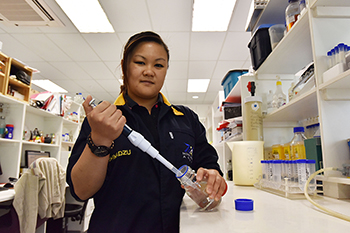Latest News Archive
Please select Category, Year, and then Month to display items
21 August 2019
|
Story Thabo Kessah
|
Photo Thabo Kessah
 Keafon Jumbam is gearing herself for the institutional Three Minute Thesis competition.
Keafon Jumbam is gearing herself for the institutional Three Minute Thesis competition.
Keafon Jumbam is a PhD candidate whose research on food and foxes has won her the first prize of R8 000 in the recent Faculty of Natural and Agricultural Sciences’ Postgraduate Flash Fact Competition. Her brief in the competition was to
summarise her research in three minutes, using only one static slide.“The competition started at departmental level on both campuses. The idea was that the best student in each department is then selected to go for the faculty-level competition on the Bloemfontein Campus. Summarising the entire research into three minutes is no easy feat, but a great way to gauge how well one has mastered your work,” she said.
Far-reaching research
“Thought-provoking presentations on research, ranging from technology to track academic progress, traditional medicine as alternatives to expensive prescriptions, and suggesting insects as food alternatives to curb hunger in this era of severe droughts and food shortages. The competition was tough, but it highlighted the level of research competitiveness on the Qwaqwa Campus. I hope that more students will join in such opportunities to build themselves up and to showcase our research output as Qwaqwa students,” added Jumbam from the
Department of Zoology and Entomology.
Institutional finals
Her next challenge is the institutional competition to be held on 23 August 2019, which could qualify her for the national competition.
The impact of personal care products on water resources in the Free State
2015-12-14

Jou-an Chen
Photo: Charl Devenish
|
Water is of the utmost importance in personal hygiene. Most people can hardly have a day go by without taking a shower in the morning and at night. However, it is this very habit that is increasingly polluting the water resources in South Africa.
Contaminants found in pharmaceutical and personal care products have been accumulating in water masses in recent years. These contaminants especially refer to hormones in medication, as well as colouring agents and fragrances used in soap, shampoo and body lotions.
“Little information and data are available on the prevalence of these contaminants, and on how high the level of pollution really is,” says Jou-an Chen, researcher in the Department of Microbial, Biochemical and Food Biotechnology at the UFS.
Her research particularly focuses on the prevalence and impact of those contaminants.
“Because these substances have not been properly investigated, we are not sure how widely it occurs and whether it is harmful to the environment. It was precisely the lack of information that has inspired me to investigate further.”
“If we could identify the contaminants and what it is doing to the environment, it could make a valuable contribution to directives on water quality standards.”